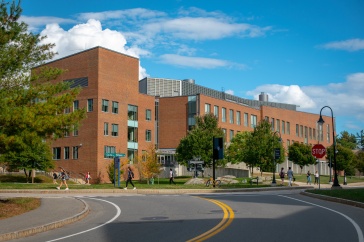
Harish Vashisth, professor of chemical engineering and bioengineering, has been awarded a five-year, $2.1 million Maximizing Investigators’ Research Award (MIRA) from the National Institutes of Health (NIH). The award will support his team’s efforts to develop innovative approaches for designing new therapies to treat diseases such as diabetes, cancer, and viral infections that impact millions of Americans every day.
“I’m very humbled and encouraged by the NIH’s continued investment in my research program,” says Vashisth. “This support will allow us to pursue new research directions, strengthen collaborations across several states, and enhance supercomputing resources at UNH.”
Vashisth’s research is focused on developing unconventional approaches to design novel therapeutic agents, which underscores UNH’s growing role in biomedical research and exemplifies the university’s mission to make meaningful impact in well-being and health.
Vashisth’s computational biophysics and biomolecular simulations aim to better understand how potential new drugs—such as small molecules, peptides, and protein-based nanobodies—bind to key proteins linked to diseases. His lab will study three different families of proteins: those involved in hormonal and visual signaling, members of the G-protein family of signaling regulators, and enzymes from SARS-CoV-2, the virus responsible for COVID-19.
A key goal of the project is to explore allosteric drug design—targeting “distant” sites on proteins rather than conventional active sites. This approach could lead to more precise and effective treatments by overcoming challenges that have limited traditional drug discovery methods. For example, one class of therapeutic agents under study includes peptides derived from cone snails and viruses that mimic insulin’s function, offering potential new treatments for diabetes.
The MIRA program, run by NIH’s National Institute of General Medical Sciences (NIGMS), is designed to give researchers greater stability and flexibility in their work. By providing longer-term funding, it allows scientists to pursue new directions and increase the likelihood of important breakthroughs while also broadening the distribution of funding among promising investigators. MIRA awards are typically granted for five years to both early-stage and established researchers.
















































